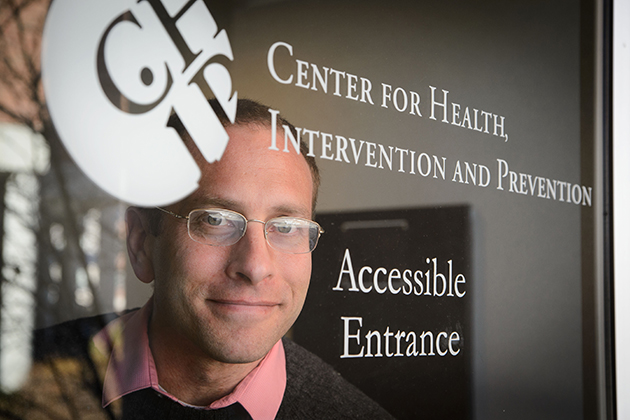
Communication between physicians and other health care providers and their patients may be taking on an entirely new dimension through text messaging, according to David Finitsis, a Ph.D. candidate in clinical psychology and lead author of a recently published article in the journal PLOS ONE.
Together with his co-authors, psychology professor Blair T. Johnson and Jennifer Pellowski, a graduate student in social psychology, Finitsis conducted a meta-analysis of eight randomized controlled trials that examined the effects of texting between health care providers and patients using antiretroviral drug therapy for the control of HIV/AIDS. The resulting article: Text Message Intervention Designs to Promote Adherence to Antiretroviral Therapy (ART) appeared in the February 2014 issue of the online journal.
Finitsis, an affiliate of the Center for Health Intervention and Prevention (CHIP), says, “With the rollout of antiretroviral therapy in the mid-1990s, a diagnosis of HIV/AIDS went from being a sure death sentence to that of a chronic disease, affording people living with HIV the possibility of achieving a more normal life expectancy. But this relies on a patient’s ability to take medication faithfully, for the rest of their lives, without interruption.”
What Finitsis and his colleagues discovered in their analysis was that the use of text messaging between health care providers and their patients living with HIV/AIDS significantly improved adherence to drug regimens. An additional finding was that patients participating in the texting trials had significantly decreased viral load when compared to control groups consisting of individuals who were receiving standard care. This means they are less likely to infect others, providing that normal precautions, such as the use of condoms during sex, are followed.
Finitsis says the technology enables communication via cell phones wherever there are cell towers, including the United States, Europe, and even developing countries such as those in sub-Saharan Africa, where the HIV/AIDS epidemic has been particularly severe.
I can foresee the day when making sure patients have their doctor’s smart phone app will be just as important as making sure they have the correct prescriptions when they leave the office.
“We looked at large and small studies,” he says, “as well as all the available literature, and when we did a statistical analysis of the data we found significantly better adherence among patients who texted over those who received more traditional follow-up – usually a visit to a doctor every six months or so.
He notes that there was considerable variation in design among the studies. In some cases there were daily reminders to take medication. Another study utilized weekly messages that just asked, ‘How’s it going?’ If someone responded that they were experiencing some kind of a problem, then they received a call from clinic staff. “The overall effects of the studies varied, but the ones that showed the best results were those that went beyond simple reminders and really tapped into the doctor-patient relationship.”
Finitsis, who has a background as an emergency medical technician and as an organ procurement coordinator for a transplant program in a major New England hospital, says that staying in touch with people who are chronically ill is important for a variety of reasons.
“What excites me most about what we found in our study is the unlimited potential for technology to make a difference in how the medical establishment relates to patients,” he says. “In addition to HIV, there are diseases such as hypertension and diabetes that require lifelong care. With transplant patients, the sheer number of medications they have to take for the rest of their lives can seem overwhelming. Sometimes people just say ‘enough!’ and they give up taking their medication. But texting might make it easier and more cost-effective for physicians and their staffs to check in – to stay in touch – to offer encouragement to people who may feel isolated because of their medical conditions and who are having a tough time coping.”
Texting is part of a larger movement within medicine called mHealth, or mobile health. “The possibilities are endless,” says Finitsis. “The fact is, we live in a world where we have increasing medical costs and decreasing resources. The ability to use mobile phones, tablet computers – even social media such as support groups on Facebook – opens up all sorts of treatment possibilities for the chronically ill. I can foresee the day when making sure patients have their doctor’s smart phone app will be just as important as making sure they have the correct prescriptions when they leave the office.”
Finitsis and Pellowski are both in the Department of Psychology’s Social Processes in AIDS training program, headed by professors Seth C. Kalichman and Dean G. Cruess. The program, funded by a Ruth L. Kirschstein Institutional National Research Service Award from the National Institute of Mental Health, helps fulfill CHIP’s mission of creating new scientific knowledge and theoretical frameworks in the areas of health behavior, health behavior change, health intervention, and prevention at the individual, family, community, and societal levels.


